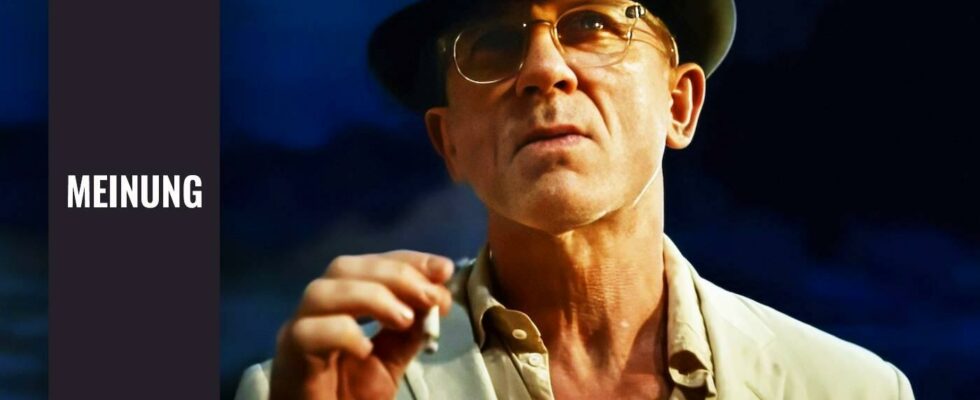James Bond is a contagious disease. This is probably how many of their actors viewed the role of an agent: on the one hand it brings fame and a lot of money, on the other hand it spreads like an infection in the biography of a star and the minds of his fans until the actor is swallowed by his character. Even the original Bond, Sean Connery, had to turn away from the role with great difficulty at some point. Daniel Craig is no different. Queer is his liberation.
The new film by star director Luca Guadagnino, which is in cinemas from today, is a captivating, enthusiastic film that will leave many with tears in their eyes. But it’s also Craig’s most serious attack on 007. He plays an anti-Bond: Lovestruck, undignified, pushy, without manners, addicted, embarrassing. But also full of love, full of desire for adventure, full of the urge to experience. Like a greasy engine racing forward despite a thousand dents.
James Bond star Daniel Craig as a gay addict: That’s what Queer is about
Queer is a loose film adaptation of the novel of the same name by American author William S. Burroughs (Naked Lunch). Craig plays the exile Lee, who is primarily looking for romantic adventures with men in Mexico City in the 1950s. One evening the heroin addict meets young Eugene (Drew Starkey). He falls madly in love in the beautiful but radically independent man. And in doing so opens a wound that will never close again.
Check out the trailer for Queer here:
Queer – Trailer (German subtitles) HD
In the first few minutes of the film, a cover of the Nirvana song All Apologies plays on the soundtrack, Daniel Craig passes the burning garbage cans of the Mexican night in slow motion, downs his third glass of mezcal with sweat-drenched hair, or pirouettes in front of Starkey’s character and dreams about it , stroking his neck, it seems like one Self-therapy of the main character. Supervised by Guadagnino. And Bond is the neurosis.
Unique Daniel Craig role: That’s why Lee is anti-Bond
Craig hasn’t been seen with so much twitching, trembling, desperate humanity in many, many years. Not in the unconventional but ultimately larger-than-life detective of Knives Out. Not in tank cracking genius Joe Bang from Logan Lucky. Especially not in the hypermasculine icons from the James Bond films, Layer Cake or Cowboys & Aliens.
Although Craig’s Bond was the first vulnerable 007, Lee is the anti-Bond. Lee’s vulnerability is not contained by the dignity of someone wearing a tuxedo. Creeping, crouching, swaying, he runs after Eugene and swallows the meanest humiliations.
Casino Royale Bond is surprisingly disarmed by his feelings for Vesper (Eva Green), but Lee has no code that will break him out of love. He runs through life like a sharp knife. There will be blood, whether his own or that of others. This is what makes the vulnerability of Craig’s queer character so special.
Daniel Craig’s Lee is as desperate and tender as Bond could ever be
However, Guadagnino and his leading actor have not simply created an opposite of Bond: Queer shares typical characteristics of the 007 films and then puts them through the meat grinder. Daniel Craig’s impressive male body makes him a capable agent that we respect. Lee is not skinny and weak in comparison, on the contrary.
The queer main character also has broad shoulders and carries a gun. She enters bars suspiciously and roams the streets like a wolf in search of prey. It’s the most brilliant move in Guadagnino’s film.
Lee’s vulnerability exposes the imposing body, the armed threat as a pose: here someone wants to appear stronger, more merciless, more authoritarian than he is. At the hint of a loving look, he lets himself fall and bends towards the affection. The pure promise of love lowers his shield.
And in perhaps Queer’s finest gesture, Guadagnino subjects Craig’s muscular body to a queer gaze that infuses it with tenderness and desire. Where the James Bond star previously used it for combat and conquest, he now makes himself the object of desire. The scenes between Craig and Starkey are incredible in the best possible way, whether having sex or being high on drugs in the South American jungle.
Queer is a small masterpiece that doesn’t always work
In all aspects, Craig ditches the 007 role with Queer, but is Guadagnino’s film good too? It is a must for cinema fans simply because of the performance of its leading actor. And that of a highly efficient Starkey, even if his more experienced scene partner outplays him.
Queer is a painful love story. But it is also the travel journal of a life addict and a drug addict – and the two don’t always mix. Against the madness of some scenes, moments on the beach in which the two photograph each other seem almost cheesy. The dream-like, almost disturbing power of some sequences stands alongside some very conventional script twists.
And the magnificent, alienating artificiality of Mexico City, which Guadagnino had recreated at the Cinecittà, meets the documentary aesthetics of a jungle journey. Queer isn’t all of a piece like Challengers – Rivals or Call Me by Your Name.
This will disappoint some Guadagnino fans. But in fact, Craig’s incredible performance and Guadagnino’s unflinching, precisely observed humanism hold everything together: Queer is a beautiful, artistically rich, tender and clever film with a great leading actor. Among Guadagnino’s films it is a small masterpiece, in Daniel Craig’s films it is a powerful and hopefully fruitful liberation.
